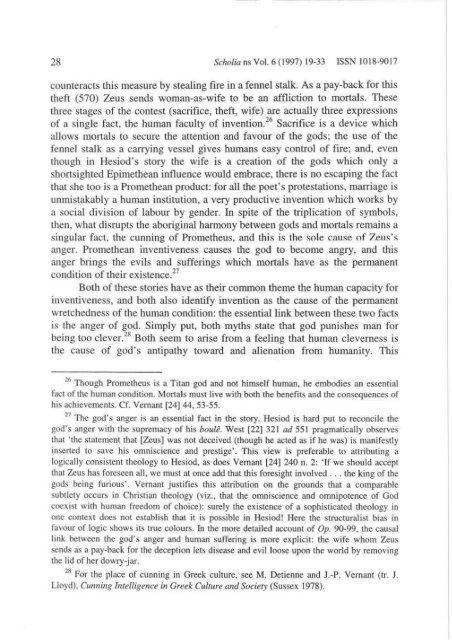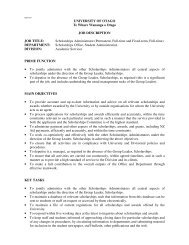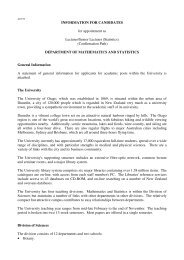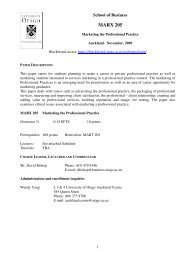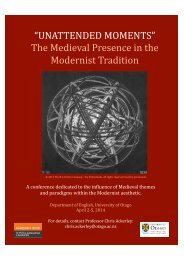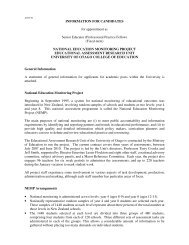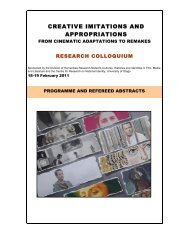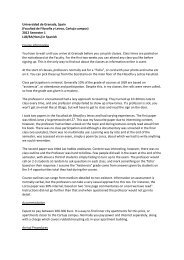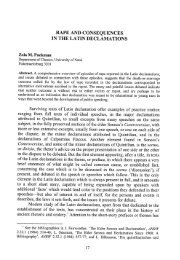scholia - University of Otago
scholia - University of Otago
scholia - University of Otago
You also want an ePaper? Increase the reach of your titles
YUMPU automatically turns print PDFs into web optimized ePapers that Google loves.
28 Sclwlia ns Vol. 6 (1997) 19-33 ISSN 1018-9017<br />
counteracts this measure by stealing fire in a fennel stalk. As a pay-back for this<br />
theft (570) Zeus sends woman-as-wife to be an affliction to mortals. These<br />
three stages <strong>of</strong> the contest (sacrifice, theft, wife) are actually three expressions<br />
<strong>of</strong> a single fact, the human faculty <strong>of</strong> invention.Z 6 Sacrifice is a device which<br />
al lows mortals to secure the attention and favour <strong>of</strong> the gods; the use <strong>of</strong> the<br />
fennel stalk as a carrying vessel gives humans easy control <strong>of</strong> fire; and, even<br />
though in Hesiod's story the wife is a creation <strong>of</strong> the gods which only a<br />
shortsighted Epimethean infl uence would embrace, there is no escaping the fact<br />
that she too is a Promethean product for all the poet's protestations, marriage is<br />
unmistakably a human institution, a very productive invention which works by<br />
a social division <strong>of</strong> labour by gender. In spite <strong>of</strong> the triplication <strong>of</strong> symbols,<br />
then, what disrupts the aboriginal harmony between gods and mortals remains a<br />
singular fact, the cunning <strong>of</strong> Prometheus, and this is the sole cause <strong>of</strong> Zeus's<br />
anger. Promethean inventiveness causes the god to become angry, and this<br />
anger brings the evils and sufferings which mortals have as the permanent<br />
condition <strong>of</strong> their existence. 27<br />
Both <strong>of</strong> these stories have as their common theme the human capacity for<br />
inventiveness, and both also identify invention as the cause <strong>of</strong> the permanent<br />
wretchedness <strong>of</strong> the human condition: the essential link between these two facts<br />
is the anger <strong>of</strong> god. Simply put, both myths state that god punishes man for<br />
being too clever.Z 8 Both seem to arise from a feeling that human cleverness is<br />
the cause <strong>of</strong> god's antipathy toward and alienation from humanity. This<br />
26 Though Prometheus is a Titan god and not himself human, he embodies an essential<br />
fact <strong>of</strong> the human condition. Mortals must live with both the benefits and the consequences <strong>of</strong><br />
his achievements. Cf. Vemant [24] 44, 53-55.<br />
27 The god's anger is an essential fact in the story. Hesiod is hard put to reconcile the<br />
god's anger with the supremacy <strong>of</strong> his boule. West [22) 321 ad 55 1 pragmatically observes<br />
that 'the statement that [Zeus) was not deceived (though he acted as if he was) is manifestly<br />
inserted to save his omniscience and prestige'. This view is preferable to attributing a<br />
logically consistent theology to Hesiod, as does Vernant [24) 240 n. 2: ' If we should accept<br />
that Zeus has foreseen all , we must at once add that this foresight involved ... the king <strong>of</strong> the<br />
gods being furious'. Vernant justifies this attribution on the grounds that a comparable<br />
subtlety occurs in Christian theology (viz., that the omniscience and ornnjpotence <strong>of</strong> God<br />
coexist with human freedom <strong>of</strong> choice): surely the existence <strong>of</strong> a sophisticated theology in<br />
one context does not establish that it is possible in Hesiod! Here the structuralist bias in<br />
favour <strong>of</strong> logic shows its true colours. In the more detailed account <strong>of</strong> Op. 90-99, the causal<br />
link between the god's anger and human suffering is more explicit: the wife whom Zeus<br />
sends as a pay-back for the deception lets disease and evil loose upon the world by removing<br />
the lid <strong>of</strong> her dowry-jar.<br />
28 For the place <strong>of</strong> cunning in Greek culture, see M. Detienne and J.-P. Vernant (tr. J.<br />
Lloyd), Cunning Intelligence in Greek Culture and Society (Sussex 1978).


